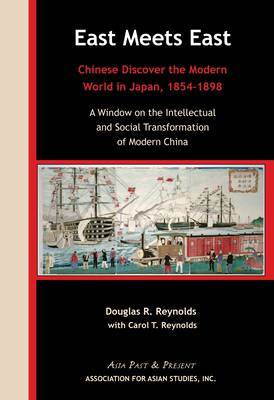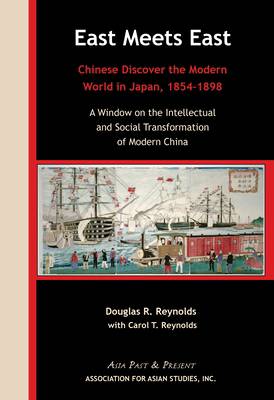
Door een staking bij bpost kan je online bestelling op dit moment iets langer onderweg zijn dan voorzien. Dringend iets nodig? Onze winkels ontvangen jou met open armen!
- Afhalen na 1 uur in een winkel met voorraad
- Gratis thuislevering in België vanaf € 30
- Ruim aanbod met 7 miljoen producten
Door een staking bij bpost kan je online bestelling op dit moment iets langer onderweg zijn dan voorzien. Dringend iets nodig? Onze winkels ontvangen jou met open armen!
- Afhalen na 1 uur in een winkel met voorraad
- Gratis thuislevering in België vanaf € 30
- Ruim aanbod met 7 miljoen producten
Zoeken
East Meets East
Chinese Discover the Modern Wold in Japan, 1854-1898. a Window on the Intellectual and Social Transformation of Modern China
Douglas R Reynolds
€ 84,95
+ 169 punten
Omschrijving
Through the lives of Chinese diplomats and their careers, East Meets East explores three important dimensions of modern Chinese history: Chinese discovery of the modern world in Japan; reports on Japan suppressed by higher authorities because of their insistent objectivity and non-Sinocentric perspective; and state-sponsored innovations to meet crises which opened the gates to intellectual and social transformations at the grassroots. Meaty reports on Japan directly informed the Hundred Days Reforms of 1898 while, inside China since 1861, extrabureaucratic government Ju (Bureaus)--industrial arsenals, navy yards, translation bureaus and schools, mines, shipping, textiles, telegraphy, and railroads--demanded the talents of "irregular path" (yitu) persons having new knowledge distinct from "regular path" (zhengtu) bureaucrats. Against this background it becomes much clearer why the Xinzheng modernization reforms after 1901 took hold and why after 1912 elites old and new rejected Yuan Shikai's bid to restore the imperial order in 1915-16. After 1916, there was no going back. The old order and era were truly "gone with the wind."
Specificaties
Betrokkenen
- Auteur(s):
- Uitgeverij:
Inhoud
- Aantal bladzijden:
- 744
- Taal:
- Engels
- Reeks:
Eigenschappen
- Productcode (EAN):
- 9780924304767
- Verschijningsdatum:
- 1/03/2014
- Uitvoering:
- Paperback
- Formaat:
- Trade paperback (VS)
- Afmetingen:
- 152 mm x 229 mm
- Gewicht:
- 1075 g

Alleen bij Standaard Boekhandel
+ 169 punten op je klantenkaart van Standaard Boekhandel
Beoordelingen
We publiceren alleen reviews die voldoen aan de voorwaarden voor reviews. Bekijk onze voorwaarden voor reviews.











